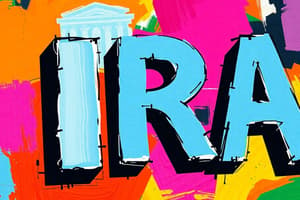Podcast
Questions and Answers
What is the primary purpose of an IRA?
What is the primary purpose of an IRA?
- To allow for tax-free withdrawals at any time
- To enable individuals to receive government aid
- To provide investment opportunities in the stock market
- To save money in a tax-advantaged manner for retirement (correct)
Which of the following statements about the tax advantages of IRAs is correct?
Which of the following statements about the tax advantages of IRAs is correct?
- Roth IRAs allow pretax contributions.
- Money in a Roth IRA grows tax-free. (correct)
- Only Traditional IRAs have contribution limits.
- Traditional IRAs do not offer tax-deferred growth.
What is the current contribution limit for individuals under 50 years old?
What is the current contribution limit for individuals under 50 years old?
- $9,000
- $6,000
- $8,000
- $7,000 (correct)
Which of the following IRA types requires an owner to take Required Minimum Distributions (RMD)?
Which of the following IRA types requires an owner to take Required Minimum Distributions (RMD)?
What is the purpose of the 60-day rule in relation to IRA contributions?
What is the purpose of the 60-day rule in relation to IRA contributions?
Which type of withdrawal from an IRA might incur a penalty?
Which type of withdrawal from an IRA might incur a penalty?
Which type of contribution allows a member to essentially ignore the amount contributed for tax purposes?
Which type of contribution allows a member to essentially ignore the amount contributed for tax purposes?
What type of withdrawal can only be performed once every 12 months?
What type of withdrawal can only be performed once every 12 months?
Flashcards are hidden until you start studying
Study Notes
Purpose of an IRA
- An Individual Retirement Account (IRA) serves as a savings vehicle for retirement, providing tax advantages.
Eligibility for Opening an IRA
- Open to anyone with earned income or those filing jointly with a spouse who has compensation.
Tax Advantages of IRA Types
- Traditional IRA: Contributions are made with pretax dollars; account grows tax-deferred until withdrawal.
- Roth IRA: Contributions are made with after-tax dollars; account grows tax-free, and withdrawals are not taxed.
Multiple IRA Accounts
- Individuals can hold different types of IRA accounts, provided total contributions do not exceed annual limits.
Current Contribution Limits
- For individuals under 50 years: $7,000 per year.
- For individuals 50 years and older: $8,000 per year.
Required Minimum Distribution (RMD)
- RMD refers to the minimum amount that must be withdrawn annually from a Traditional IRA after reaching a certain age.
RMD Requirement
- Traditional IRAs require account owners to take RMDs, whereas Roth IRAs do not.
Access to Funds
- Funds from a Transfer contribution cannot be accessed by the member.
60-Day Rule
- Applicable to Rollover and Conversion contributions, requiring funds to be redeposited within 60 days.
Contribution Status
- Recharacterization allows members to effectively ignore a contribution and alter its designation.
Common Types of Distributions
- Four main types: Normal, Transfer, Rollover, and Early distributions.
Tax Reporting for Withdrawals
- Withdrawals from an IRA are reported on the IRS tax form 1099-R.
Penalty for Withdrawals
- Early withdrawals made before the age of 59½ may incur penalties.
Rollover Restrictions
- Rollover withdrawals are limited to once every 12 months.
Studying That Suits You
Use AI to generate personalized quizzes and flashcards to suit your learning preferences.




